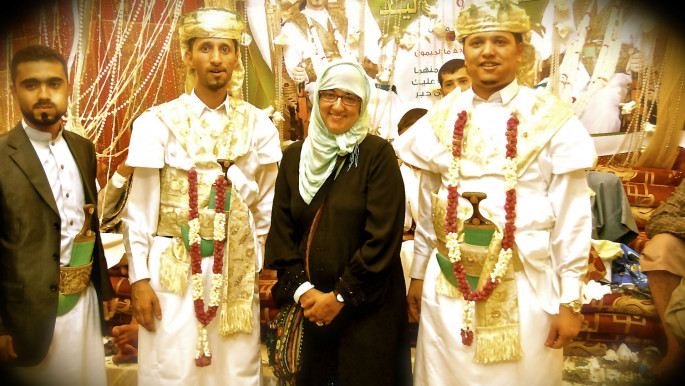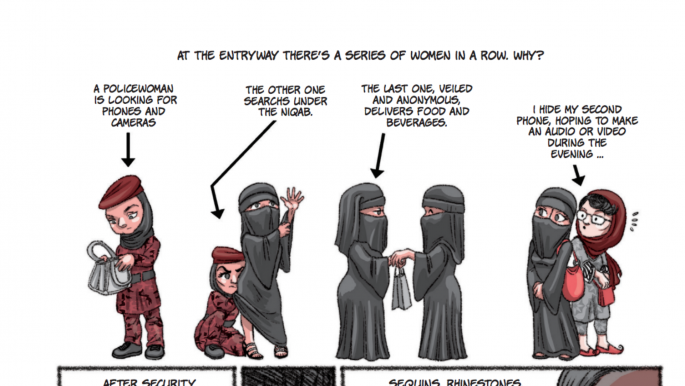La Sposa Yemenita: A graphic and novel expression of Yemen's women
The devastating civil war in which regional powers battle through local proxies, the growth of Al Qaeda in the Arabian Peninsula, and the cholera epidemic as a result of a bombed-out healthcare system all tend to dominate any news emanating from the country which was the Arab world's poorest nation even before the war.
This singular focus can be frustrating for journalists such as Laura Silvia Battaglia, an Italian reporter who has extensively covered the Middle East, with a special focus on Yemen, for the better part of the past decade. With such a heavy focus on security and terrorism, Battaglia decided more nuance was needed in portraying such a complex country.
That's why Battaglia and graphic illustrator Paola Cannatella teamed up to make La Sposa Yemenita, a graphic novel depicting some of Battaglia's reporting from Yemen over the past few years. Currently, the graphic novel can only be found in Italian but an English version is in the works.
In La Sposa Yemenita, Battaglia shows the country she's grown to know and love "through the lives of small local communities and the small daily gestures that go beyond all prejudices and barriers".
"There is a problem with Al Qaeda and ISIS in Yemen," Battaglia recently told The New Arab. "But I want to show the reasons behind that, and also that there are other stories that are oversimplified or ignored."
 |
|
| Laura Silvia Battaglia sneaks into the groom's section of a Yemeni wedding [Laura Silvia Battaglia] |
The war in Yemen is devastating the country. More than 5,000 children were wounded or died from injuries sustained in the war, and 400,000 are severely malnourished, the UN reported in January.
It can be difficult to tell stories when lives are so carelessly tossed aside. But Battaglia's goal with this book is to build empathy with the struggles of common Yemenis whose suffering will continue as long as bombs continue to fall.
These are the sorts of stories upon which Battaglia hopes to shed more light with La Sposa Yemenita.
The book is broken down into three sections, each depicted by a primary colour. The graphics shaded in red represent stories of daily life - such as a wedding she attended where she was gifted a red rose that foretold she would be the next to wed (and she was). There is also yellow, which contains stories of cultural reflection and comparison to the West, and blue, the colour where the most difficult moments are shown, such as Battaglia's reporting on IS, drone strikes, child trafficking and kidnappings.
Despite the presence of difficult and tragic topics, Battaglia still hopes the main takeaway from the story is more optimistic. For every moment of tragedy, there are moments of laughter and joy.
Battaglia wasn't able to provide Cannatella with pictures from the wedding, so the drawings are recreations from details Battaglia relayed to the illustrator.
One panel shows Battaglia standing in line to enter the celebrations with Jamilla, a friend of a friend, and a number of women in the full veiling of the niqab. In Yemen, weddings are traditionally closed affairs where the sexes are divided - men celebrate with men while in a separate location women celebrate with women.
After passing through a police inspection, where female officers frisked the entrants, the niqabs were removed and the women were free to dress as they pleased. Battaglia described her wonder at an event where women decided to dress seductively and stylishly despite the absence of the opposite sex.
"I learned about the nature of women and their desire to express their femininity," she told The New Arab. But she also learned an interesting technique in Yemeni matchmaking.
The seating situation, she learned, was tactical. Some single women would then do their best at dancing seductively in front of certain elder women.
"There was one particular curvy woman who was performing a seductive Egyptian dance, similar to belly dancing, in front of one older woman," Battaglia said. "At first I thought maybe they were lesbians but what I was told is that the woman was dancing for a husband."
The dancing woman was hoping the mother would deem her a suitable wife for her son and set them up as a couple.
 |
|
| Laura Silvia Battaglia documented her experience with gender while staying in Yemen [La Sposa Yemenita] |
This is just one shade of the complexity found in Yemeni culture - a culture with probably the oldest history in the Arabian peninsula, and one that has been influenced by more powerful neighbours in recent years.
Shedding light on such complexities was certainly a drive behind Battaglia's desire to share her story with a wider audience - particularly when the country is reeling from a war that is eclipsing struggles such as the fight against child marriage.
But there was also another major consideration for Battaglia when compiling the comic. The past couple of years has seen a major increase in refugees and migrants landing on Italian shores.
The large number of newcomers has shocked Italy to the point that even the left-leaning government, led by Paolo Gentiloni and the Democratic Party, has been working hard to cut back on new entries.
With an election looming in March, and xenophobia and anti-immigrant and anti-Muslim sentiment on the rise, politicians seem intent on finding any short-term solution to stop these refugees and migrants from arriving.
Battaglia said she doesn't expect her book to change the mind of a rampant xenophobe. But she does hope that the main message - that Yemen is more complex than stories about Al Qaeda and child marriage, and that people from different cultures are still people who can love each other - resonates with readers.
Battaglia also hopes Italians and others will pick up the book and realise the story is not about her. When she reports, Battaglia says she removes herself from the story. In this work, she hopes to not be the focus but a vessel through which the reader can attain a better understanding of the subtleties of Yemen and its people.
"The main message is that we may be from different places but we are still people and we can still love and accept each other," she said.
Follow The New Arab on Twitter: @the_newarab



